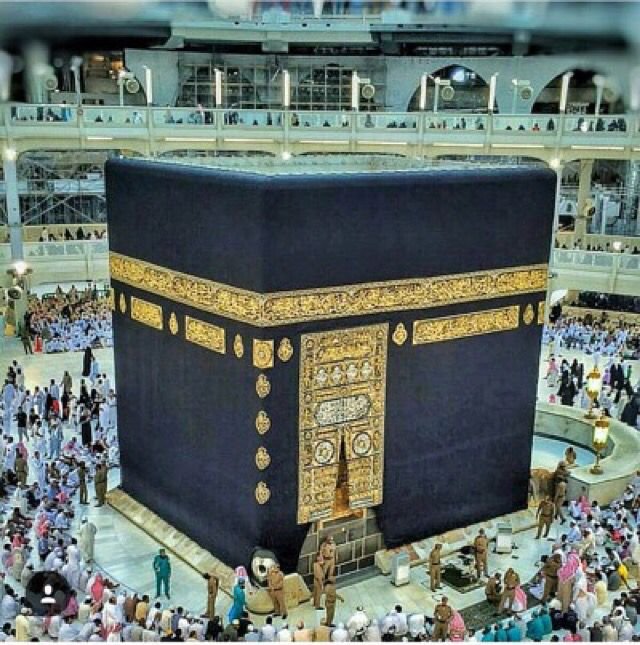By Shaykh Huzeifa Patel
As the time for Ḥajj approaches there are many lessons we can learn from this great event. These lessons can be learnt from the Holy Qurʿān, and its description of Ḥajj. In the Qurʿān there are many references to the Kaʾaba (grand mosque), Ibrāhim (peace and blessings upon him) and the rituals of Ḥajj. We find in the Qurʿān, Almighty Allāh discusses very little about the masāail, rules and regulation of Ḥajj; but focuses on Ibrāhim (peace and blessings upon him) and his relationships. Almighty Allāh depicts the life of Ibrāhim (peace and blessings upon him) and the trials he faced during his life. We are also told about the love, eagerness and extreme devotion Ibrāhim (peace and blessings upon him) possessed.
There is one story in particular of Ibrāhim (peace and blessings upon him) at the time when he was building the Kaʾaba. Almighty Allāh says in Sūrah al-Baqarah verse 127,
“And (mention) when Abraham was raising the foundation of the house and [with him] Ismāʿīl, (saying), our Lord, accept [this] from us. Indeed, You are the Hearing, the Knowing.”
In this verse Almighty Allāh draws our attention to the supplication of Ibrāhim (peace and blessings upon him),
“Oh Allāh accept (this) from us.”
Let us analyze this supplication.
Ibrāhim (peace and blessings upon him) was building the Kaʾaba, the most grand place for God, yet Ibrāhim was so humble that he was asking for acceptance on such a magnanimous deed, from Almighty Allāh.
The humility and humbleness of the Khalīl (friend) of Almighty Allāh is incredible. At this crucial moment, the thought does not occur to him that he has the great task to erect the House on a noblest portion of the earth. He does not have this thought, pride or vanity that he has achieved something great, or even that he is now completing a great commandment of Allāh. Rather, his concern was,
“O Allah accept from us.”
The ʿulema (scholars) write a very interesting point which should be noted here. The word used by Ibrāhim (peace and blessings upon him) is “taqabbal”. Another word that can be used is “qabūl”. Both words mean “acceptance”. “qabūl” (acceptance and approval) is issued when one has done something worthy of acceptance where as “taqabbal” is referred to those things which are not fit for acceptance. Here Ibrāhim (peace and blessings upon him) is worried wether his service is accepted or not, “O Allāh through Your grace accept what we have rendered.”
Allāh Almighty is actually teaching you and I, the reciter of the Qurʿān, a great lesson from this verse. Whatever worship we carry out, whatever service of dīn (religion) we conduct, however great it may be, pride and arrogance should not enter the heart. Rather fear and concern of acceptance should. This is the worry we should have.
Muftī Shafī (may Allāh’s mercy be with him) in his monumental work ‘Maʿārif al-Qurʿān, writes in the commentary of this verse,
“Verse 127 shows another essential quality of this great prophet. In obedience to Allāh, he had left the fertile land of Syria and made his wife and child to settle in the barren desert, and now he was taking up the labour of building “the House of Allāh.” This was a moment when a man who had been bearing such hardships in the way of Allāh could normally be expected to feel satisfied with himself and relax in a mood of self-congratulation. But “the Friend of Allāh” recognized the Majesty of Allāh, and knew that no creature can possibly worship or obey his Creator as is His due, but within his own limited powers. Consequently, he also knew that in performing the hardest of the greatest tasks one should not be proud of one’s attainment, but should, in all humility, pray to Allāh to accept the little effort one has been capable of making – and that, too, with the grace of Allāh Himself. That is exactly what Ibrāhim (peace and blessings upon him) did when he started, along with his young son, to build the Kaʾbah. That is to say, he prayed to Allāh to accept this deed, for Allāh hears all prayers, and knows the intention of his creatures.”
“Ibn Abī Ḥatim narrated that Wuhayb bin Al-Ward recited the verse, “(And (remember) when Ibrāhim and [his son] Ismā`īl were raising the foundations of the House (the Ka`bah at Makkah), (saying), “Our Lord! Accept (this service) from us)” and cried and said, “O Khalīl of Ar-Raḥmān! You raise the foundations of the House of Ar-Raḥmān (Allāh), yet you are afraid that He will not accept it from you.”This is the behavior of the sincere believers, whom Allāh described in His statement, “(And those who give that which they give)” (23:60) meaning, they give away voluntary charity, and perform the acts of worship yet, (with their hearts full of fear) (23: 60) afraid that these good deeds might not be accepted of them.” (Ibn Kathīr)
Let us look at our beloved Prophet (peace and blessings upon him). After every ritual prayer, he would seek forgiveness three times. (Muslim)
Why was this? We know well of the Prophet’s prayer. “Ibn Abbas (may Allāh be pleased with him) narrated the ḥadīth at the time of an eclipse in detail and [then mentioned that the people] said, “O Allāh’s Messenger! We saw you taking something from your place and then we saw you retreating.” the Prophet (peace and blessings upon him) replied, “I saw paradise (stretched my hands towards) a bunch (of fruits, when you saw me taking something) and had I taken it, you would have eaten from it as long as the world remains. I also saw the Hell-fire and I had never seen such a horrible sight [when you saw me retreating].” (Bukhārī)
This was the ṣalāh of our Prophet (peace and blessings upon him) yet he would seek forgiveness. Why was this? The reason is the Prophet (peace and blessings upon him) would feel he had not fulfilled the true right of worshipping Allāh Almighty.
Allāh Almighty mentions in Sūrah Al-Dhāriyāt 51:15-18, “Indeed, the righteous will be among gardens and springs, accepting what their Sustainer has given them. Indeed, they were before that, doers of good. They used to sleep but little at night; And in the hours before dawn, they would ask forgiveness. Allāh Almighty mentions in this verse the qualities of the believers, that they observe the night prayers thereafter at the time of suḥūr (dawn) they seek forgiveness.
This is the servitude we need to inculcate into our hearts, the attitude of the prophets and the pious. The concern that whatever service I render for dīn, whatever worship I may observe, this is not worthy of acceptance, O Allāh it is only through Your grace that you accept the little that we have done.”




